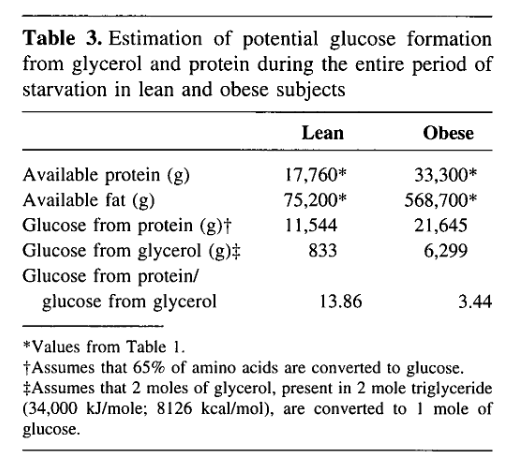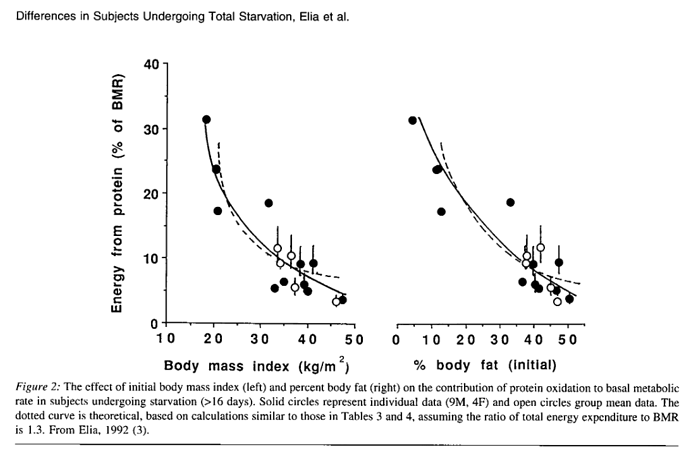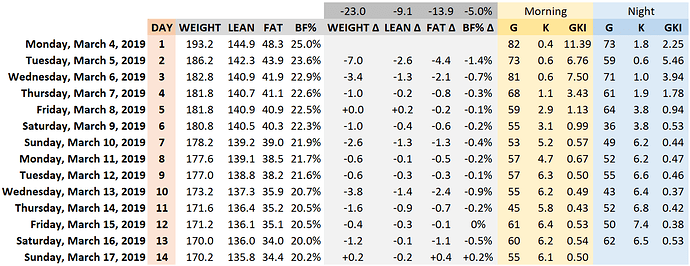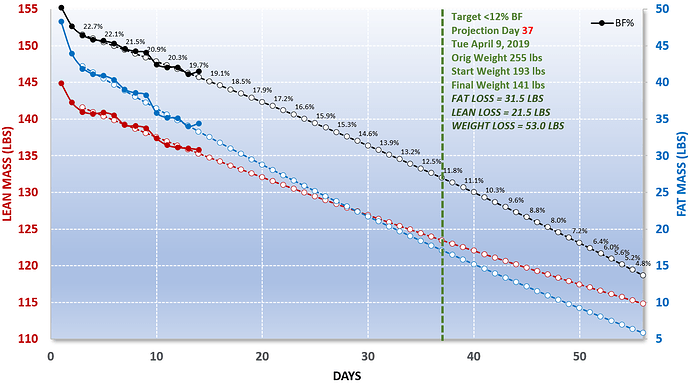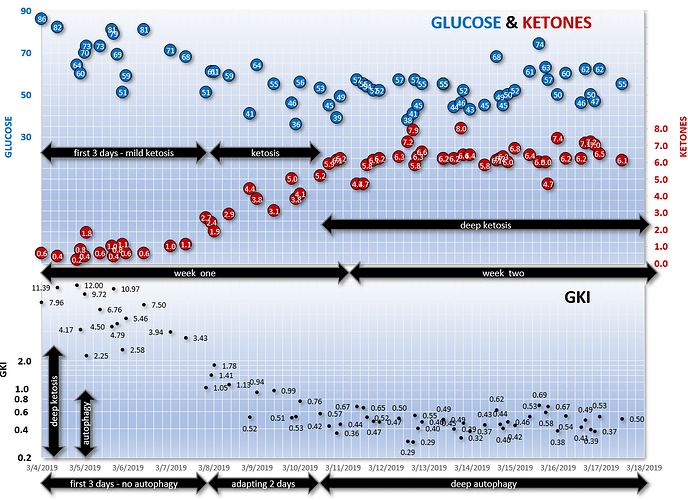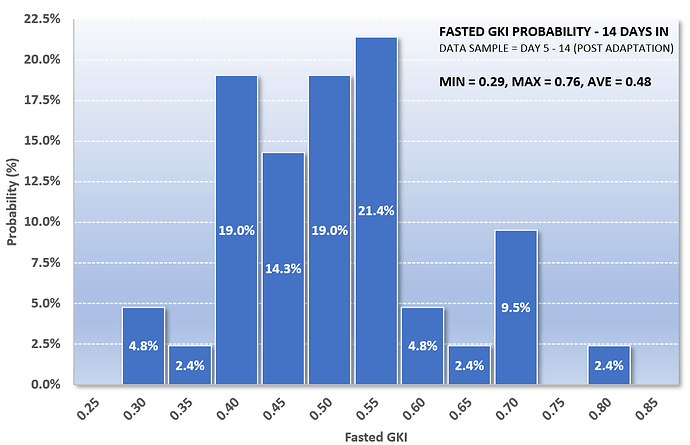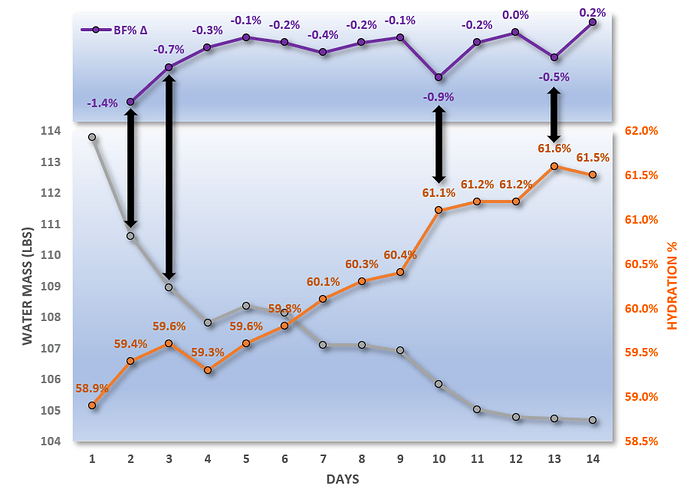ok … Day 14 results - very unusual but I’m not discouraged. In fact, I think it’s good.
First, the daily mass change and blood:
FAT MASS GAIN?
So this is the first day where my weight, fat mass and body fat% has gone back up… during a fast… after 14 days! This along with a decline of 0.2 lbs of lean mass too.
My first reaction was “REALLY?” … ok… it was more foul mouthed than that… then I had a minute to think about it and I think this is very good.
Hear me out:
There are different ways that the body deals with fat and different kinds of “deep fat” stores. The easily accessible fat is the stuff that it knows is part of normal fluctuations. With my 3 day fasts and my recent intentional weight gain to prepare for this EF, my body has a pretty large store of these fat cells that it doesn’t expect will last for a long window of time. It’s more like “easy access” fat and when the lipids run out, it allows the cell to collapse quickly.
The other kind of fat cell is the “deep storage” fat. This is the stuff that the body is convinced it will need again and will instead fill with water in order to retain it’s physical form. Water is heavier than fat and will actually read as “fat gain”. This only happens when the body has exhausted all the “easy access” fat stores and has to go deeper. Coincidentally, this happens on my 14th day of fasting = two days longer than my longest historical EF. It takes the body a couple of days to adjust and the body has an amazingly long memory… it still remembers my fast for months ago!
So, perversely, this fat mass gain is exactly what I needed to see to mark the transition… If it’s true, then in a couple of days, I expect a large water flush once my body accepts that this is not a temporary state. I hope it happens before the DEXA scan on Friday so I can get a more accurate measure.
I originally thought that it might be associated with my Leucine cycle (I now it sounds like anabolic cycling). I think the blood results still show a very high ketone to glucose ratio, and I think the lipid oxidation is still very high and I’m in heavy ketosis - in fact, I think it’s actually accelerating my real fat loss. I’m going to use the term “lipid oxidation” to differentiate it from fat mass loss since the two are now disjointed.
LEUCINE:
Back to the Leucine test results - basically, the body operates on hormonal markers and the amino acid signalling “could” trigger the body to turn anabolic and turn off autophagy, even in a fasted state. I don’t have any scientific papers that show that the hormonal signaling results in different reactions in muscle vs. skin vs. fat. That’s actually part of this experiment - I had no resources so I’m trying this to learn my n=1. My GKI shows that the Leucine is having almost no effect on my ketones and glucose. Waking up at 55G and 6.1K is pretty much where I was before the cycling.
So today, I’m doing it again, but I’m going to add 1g of Carnitine with each cycle too!
ANTI-OXIDANTS
I am concerned with the use of specific amino acids in higher doses. This is the kind of thing that triggers cancer in lab mice (in much much higher doses). This doesn’t happen when eating normal foods because the combination of chemicals in natural foods seem to offset any individual effects of any one amino acid. I’m including anti-oxidants to try and offset this. This is a completely separate path of supplementation, but I think it’s prudent. Here’s what I’m using: Resveratrol, NAC (N-acetyl cysteine), and NAD (nicotinamide adenine dinucleotide). I take Niacin supplements anyway and that’s a precursor for a lot of these anti-oxidants too. I also take CoQ10 and use PQQ (Pyrroloquinoline Quinone ) for mitochondrial health.
These supplements are part of a separate line of investigation that precedes this fast and that I think is becoming more important as I start to dig deeper into these amino acid cycles. I am in no way recommending any of this. I’m just sharing it so others can hopefully benefit.
PROJECTIONS
So - on to the rest of the data update. I’m going to keep the projections as they are and just plot the new actual data to show how the two compare.
You may notice that the projections are a little different today, but I didn’t use the latest updated results. I found a small math error and went back to correct it.
GKI
And here’s the G, K, and GKI updated…
I’m still gelling over Nick and Doug’s ideas… more to come on that too.

 Getting complicated all of a sudden. I see what you mean, but don’t know how it would all work out. Exercise itself stimulates autophagy in skeletal muscles, so it’s working against mTOR there. And too little as well as too much autophagy is detrimental for muscle tissue.
Getting complicated all of a sudden. I see what you mean, but don’t know how it would all work out. Exercise itself stimulates autophagy in skeletal muscles, so it’s working against mTOR there. And too little as well as too much autophagy is detrimental for muscle tissue.